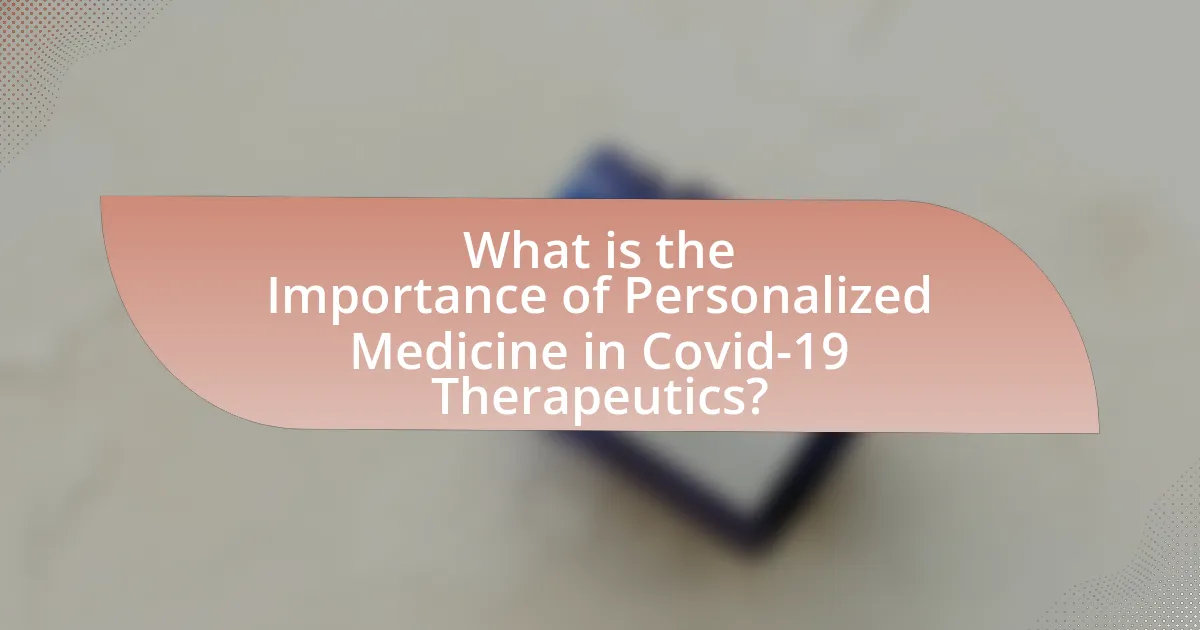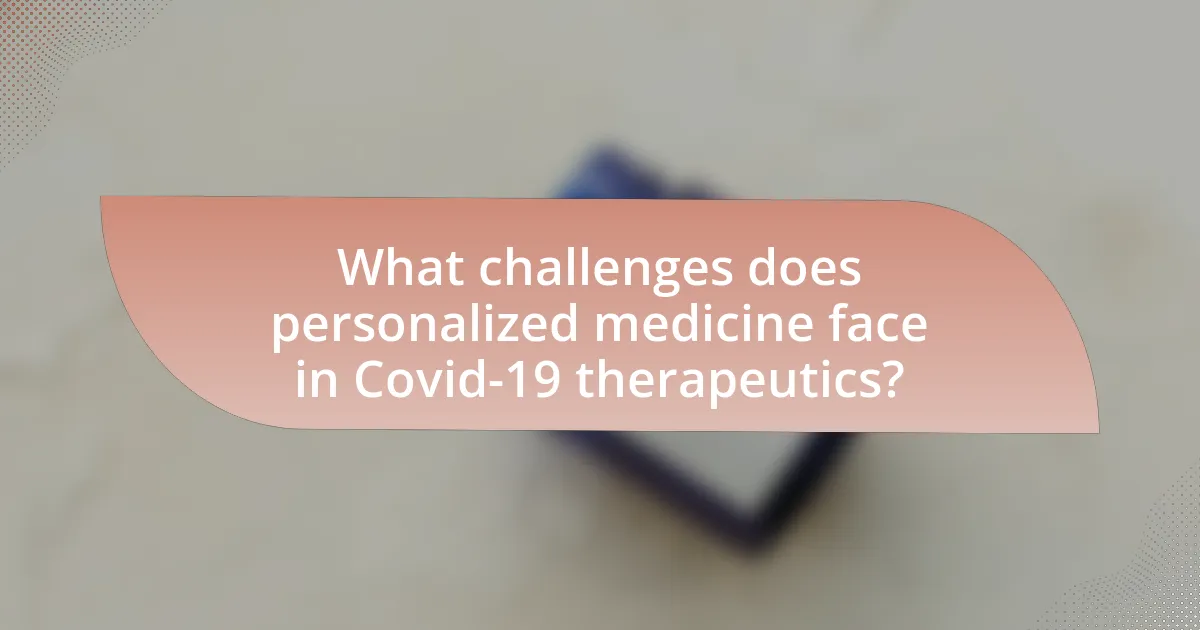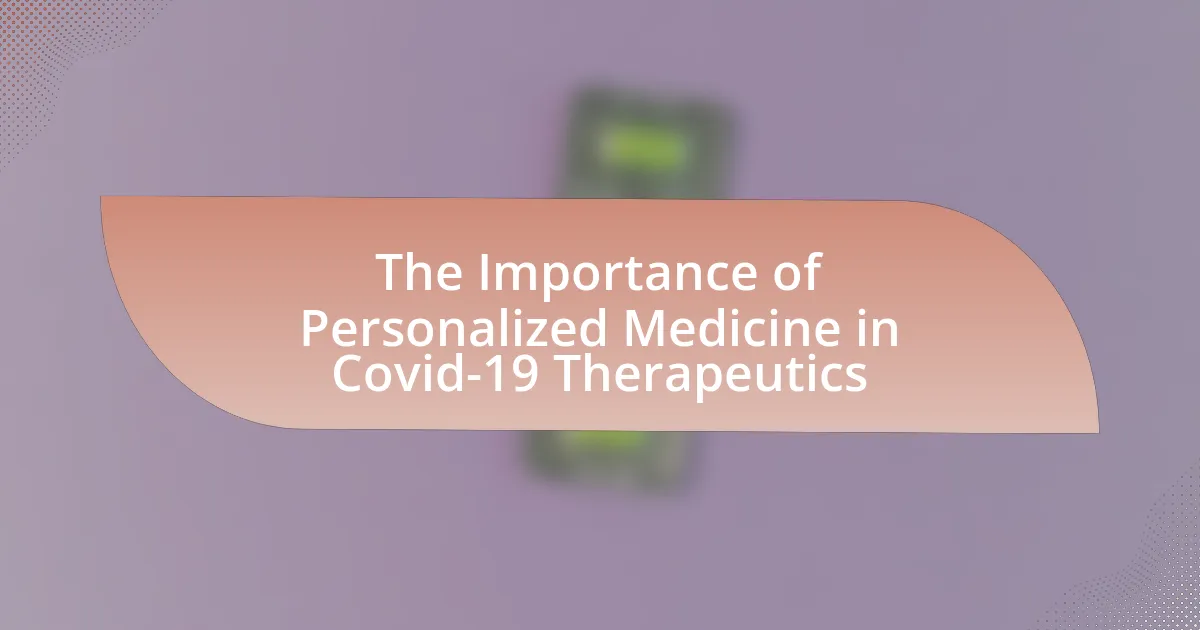Personalized medicine is a critical approach in Covid-19 therapeutics, focusing on tailoring treatment strategies to individual patient characteristics, including genetic, environmental, and lifestyle factors. This method enhances treatment efficacy and minimizes adverse effects by allowing healthcare providers to select the most effective therapies based on specific patient profiles. The article explores the differences between personalized and traditional treatment approaches, the role of genetic profiling, and the potential benefits of personalized medicine in improving patient outcomes. Additionally, it addresses the challenges and barriers to implementing personalized medicine, the importance of healthcare infrastructure, and the future prospects of this approach in response to emerging Covid-19 variants.

What is the Importance of Personalized Medicine in Covid-19 Therapeutics?
Personalized medicine is crucial in Covid-19 therapeutics as it tailors treatment strategies to individual patient characteristics, enhancing efficacy and minimizing adverse effects. This approach considers genetic, environmental, and lifestyle factors that influence disease progression and treatment response. For instance, studies have shown that specific genetic markers can predict how patients will respond to antiviral therapies, allowing healthcare providers to select the most effective treatment options. Additionally, personalized medicine can help identify patients at higher risk for severe disease, enabling proactive management and targeted interventions. This tailored approach ultimately leads to improved patient outcomes and more efficient use of healthcare resources.
How does personalized medicine differ from traditional approaches in Covid-19 treatment?
Personalized medicine in Covid-19 treatment tailors therapies based on individual patient characteristics, such as genetic makeup and specific health conditions, whereas traditional approaches typically apply standardized treatments to all patients regardless of their unique profiles. This individualized strategy allows for more effective targeting of therapies, as evidenced by studies showing that patients receiving personalized treatment regimens experience better outcomes, including reduced hospitalization rates and improved recovery times. For instance, the use of monoclonal antibodies has been optimized in personalized medicine to match specific viral variants and patient responses, demonstrating a significant advancement over one-size-fits-all methods.
What are the key principles of personalized medicine?
The key principles of personalized medicine include tailoring medical treatment to the individual characteristics of each patient, utilizing genetic, environmental, and lifestyle factors to inform healthcare decisions. This approach enhances the efficacy of treatments by ensuring they are suited to the specific biological makeup of the patient, as evidenced by the success of targeted therapies in oncology, where treatments are designed based on the genetic profile of tumors. Personalized medicine also emphasizes the importance of predictive analytics, which can forecast disease risk and treatment response, thereby improving patient outcomes and minimizing adverse effects.
How does genetic profiling play a role in personalized Covid-19 therapeutics?
Genetic profiling plays a crucial role in personalized Covid-19 therapeutics by enabling the identification of individual genetic variations that influence drug response and disease susceptibility. This tailored approach allows healthcare providers to select the most effective treatments based on a patient’s unique genetic makeup, thereby improving therapeutic outcomes. For instance, studies have shown that genetic factors can affect how patients metabolize antiviral drugs, leading to variations in efficacy and safety. By utilizing genetic profiling, clinicians can optimize treatment regimens, minimize adverse effects, and enhance the overall management of Covid-19, as evidenced by research indicating that personalized therapies can significantly improve recovery rates in genetically diverse populations.
Why is personalized medicine crucial for effective Covid-19 treatment?
Personalized medicine is crucial for effective Covid-19 treatment because it tailors therapies to individual patient characteristics, enhancing treatment efficacy and minimizing adverse effects. This approach considers genetic, environmental, and lifestyle factors that influence how patients respond to Covid-19 therapies. For instance, studies have shown that specific antiviral treatments, such as remdesivir, are more effective in certain patient populations based on genetic markers. Additionally, personalized medicine can identify patients at higher risk for severe disease, allowing for timely interventions. This targeted strategy has been supported by research indicating that personalized treatment plans lead to improved patient outcomes and resource optimization in healthcare settings.
What are the potential benefits of personalized medicine in managing Covid-19?
Personalized medicine offers significant benefits in managing Covid-19 by tailoring treatment strategies to individual patient characteristics, such as genetic makeup and health history. This approach enhances the efficacy of therapies, as evidenced by studies showing that patients with specific genetic profiles respond better to certain antiviral medications, like remdesivir. Additionally, personalized medicine can improve patient outcomes by identifying those at higher risk for severe disease, allowing for earlier intervention and more targeted preventive measures. For instance, genomic studies have revealed that variations in the ACE2 gene can influence susceptibility to Covid-19, enabling healthcare providers to customize treatment plans accordingly.
How can personalized medicine improve patient outcomes in Covid-19 cases?
Personalized medicine can improve patient outcomes in Covid-19 cases by tailoring treatment strategies based on individual patient characteristics, such as genetic makeup and comorbidities. This approach allows healthcare providers to identify which patients are at higher risk for severe disease and to customize therapies that target specific pathways involved in the virus’s pathology. For instance, studies have shown that patients with certain genetic variants may respond better to specific antiviral medications or monoclonal antibodies, leading to improved recovery rates and reduced hospitalization times. Additionally, personalized medicine can facilitate more effective vaccine strategies by identifying which populations may benefit from specific vaccine formulations, thereby enhancing overall vaccine efficacy.

What challenges does personalized medicine face in Covid-19 therapeutics?
Personalized medicine faces several challenges in Covid-19 therapeutics, primarily due to the variability in patient responses to treatments. This variability arises from genetic differences, comorbidities, and the dynamic nature of the virus itself, which can lead to inconsistent therapeutic outcomes. For instance, studies have shown that genetic polymorphisms can influence drug metabolism and efficacy, complicating the development of tailored therapies. Additionally, the rapid mutation rate of SARS-CoV-2 poses a challenge for creating effective personalized treatment protocols, as therapies may become less effective against emerging variants. Furthermore, the lack of comprehensive genomic data on diverse populations limits the ability to develop universally applicable personalized treatment strategies.
What are the barriers to implementing personalized medicine in Covid-19 treatment?
The barriers to implementing personalized medicine in Covid-19 treatment include limited access to genomic testing, insufficient data on patient variability, and challenges in integrating personalized approaches into existing healthcare systems. Limited access to genomic testing restricts the ability to tailor treatments based on individual genetic profiles, which is essential for personalized medicine. Insufficient data on how different patients respond to Covid-19 treatments hinders the development of effective personalized strategies. Additionally, existing healthcare systems often lack the infrastructure and resources to support the integration of personalized medicine, making it difficult to adopt these approaches widely.
How do regulatory issues impact the adoption of personalized medicine?
Regulatory issues significantly hinder the adoption of personalized medicine by creating barriers to approval and reimbursement processes. These regulations often require extensive clinical trials that can be time-consuming and costly, delaying the introduction of innovative therapies tailored to individual patient needs. For instance, the U.S. Food and Drug Administration (FDA) has stringent guidelines for the approval of personalized treatments, which can lead to longer timelines for bringing these therapies to market. Additionally, reimbursement policies from insurance companies may not adequately cover personalized medicine, further discouraging healthcare providers from adopting these approaches. This regulatory landscape can stifle innovation and limit patient access to potentially life-saving personalized therapies, particularly in urgent contexts like Covid-19, where timely treatment options are critical.
What role does healthcare infrastructure play in the effectiveness of personalized medicine?
Healthcare infrastructure is crucial for the effectiveness of personalized medicine as it enables the integration of advanced technologies, data management, and patient care systems necessary for tailored treatments. A robust healthcare infrastructure supports the collection and analysis of genetic, environmental, and lifestyle data, which are essential for developing personalized therapeutic strategies. For instance, the implementation of electronic health records and genomic databases facilitates the identification of patient-specific treatment options, enhancing outcomes in conditions like COVID-19. Studies have shown that healthcare systems with strong infrastructure can better deploy personalized medicine approaches, leading to improved patient responses and reduced adverse effects.
How can data and technology enhance personalized medicine for Covid-19?
Data and technology enhance personalized medicine for Covid-19 by enabling tailored treatment strategies based on individual patient profiles. Advanced analytics and machine learning algorithms analyze vast datasets, including genomic information, clinical histories, and real-time health data, to identify specific biomarkers associated with Covid-19 severity and treatment response. For instance, studies have shown that integrating genomic sequencing data can help predict which patients are at higher risk for severe outcomes, allowing healthcare providers to prioritize interventions accordingly. Additionally, telemedicine platforms facilitate continuous monitoring and personalized care adjustments, improving patient outcomes through timely interventions.
What technologies are essential for advancing personalized medicine in Covid-19 therapeutics?
Essential technologies for advancing personalized medicine in Covid-19 therapeutics include genomic sequencing, artificial intelligence (AI), and bioinformatics. Genomic sequencing allows for the identification of specific viral strains and patient genetic variations, enabling tailored treatment strategies. AI facilitates the analysis of vast datasets to predict patient responses to therapies, while bioinformatics integrates biological data to enhance understanding of disease mechanisms and treatment efficacy. These technologies collectively support the development of targeted therapies and improve patient outcomes in Covid-19 treatment.
How does big data contribute to the development of personalized treatment plans?
Big data significantly contributes to the development of personalized treatment plans by enabling the analysis of vast amounts of patient data, including genetic information, medical histories, and treatment responses. This data-driven approach allows healthcare providers to identify patterns and correlations that inform tailored therapies for individual patients. For instance, studies have shown that utilizing big data analytics can improve treatment outcomes in COVID-19 patients by matching them with the most effective therapies based on their unique health profiles. A specific example is the use of machine learning algorithms to analyze electronic health records, which has led to more accurate predictions of patient responses to antiviral treatments, thereby optimizing therapeutic strategies.

What are the future prospects of personalized medicine in Covid-19 therapeutics?
The future prospects of personalized medicine in Covid-19 therapeutics are promising, as advancements in genomics and data analytics enable tailored treatment strategies. Personalized medicine can enhance therapeutic efficacy by identifying specific patient characteristics, such as genetic predispositions and immune responses, which influence disease progression and treatment outcomes. For instance, studies have shown that genetic variations can affect how patients respond to antiviral drugs, suggesting that personalized approaches could optimize treatment regimens. Additionally, ongoing research into biomarkers for Covid-19 severity and response to therapies supports the potential for individualized treatment plans, ultimately improving patient care and outcomes.
How might personalized medicine evolve in response to emerging Covid-19 variants?
Personalized medicine may evolve to incorporate genomic sequencing and tailored therapies in response to emerging Covid-19 variants. As variants exhibit different mutations that affect transmissibility and vaccine efficacy, personalized approaches can enable healthcare providers to identify specific genetic markers in patients that influence their response to treatments. For instance, studies have shown that certain genetic profiles can predict how individuals respond to antiviral medications or vaccines, allowing for customized treatment plans that enhance effectiveness. This evolution is supported by ongoing research, such as the work published in “Nature” by Wang et al. (2021), which highlights the importance of understanding genetic diversity in the population to optimize therapeutic strategies against Covid-19 variants.
What research is currently being conducted to enhance personalized medicine for Covid-19?
Current research to enhance personalized medicine for Covid-19 includes studies focused on genomic profiling of patients to tailor treatments based on individual genetic responses to the virus. For instance, the COVID-19 Host Genetics Initiative is investigating how genetic variations affect susceptibility and severity of Covid-19, aiming to identify biomarkers that can guide personalized therapeutic strategies. Additionally, research published in journals like Nature and The Lancet is exploring the efficacy of specific antiviral drugs and monoclonal antibodies in diverse patient populations, emphasizing the need for individualized treatment plans based on patient characteristics and disease progression. These efforts are crucial for developing targeted therapies that improve patient outcomes in Covid-19.
How can collaboration between stakeholders improve personalized medicine approaches?
Collaboration between stakeholders can significantly enhance personalized medicine approaches by integrating diverse expertise and resources, leading to more tailored and effective treatments. For instance, partnerships among pharmaceutical companies, healthcare providers, and research institutions facilitate the sharing of genomic data and clinical insights, which are crucial for developing targeted therapies. A study published in the journal “Nature” highlighted that collaborative efforts in genomic research during the COVID-19 pandemic accelerated the identification of genetic markers associated with severe disease, enabling the design of personalized treatment protocols. This synergy not only improves patient outcomes but also optimizes resource allocation and speeds up the innovation process in personalized medicine.
What best practices can be adopted for implementing personalized medicine in Covid-19 therapeutics?
Best practices for implementing personalized medicine in Covid-19 therapeutics include utilizing genomic profiling to tailor treatments based on individual patient characteristics. This approach allows healthcare providers to identify specific genetic markers associated with Covid-19 severity and response to therapies, enabling more effective and targeted interventions. For instance, studies have shown that patients with certain genetic predispositions may respond better to specific antiviral medications or monoclonal antibodies, thus improving clinical outcomes. Additionally, integrating real-time data analytics can enhance decision-making by continuously assessing patient responses and adjusting treatment plans accordingly. This data-driven approach has been validated in clinical settings, demonstrating improved patient management and resource allocation during the pandemic.
What strategies can healthcare providers use to integrate personalized medicine into treatment protocols?
Healthcare providers can integrate personalized medicine into treatment protocols by utilizing genomic testing to tailor therapies based on individual patient profiles. This approach allows for the identification of specific genetic markers associated with disease susceptibility and treatment response, which is particularly relevant in managing COVID-19. For instance, studies have shown that patients with certain genetic variants may respond differently to antiviral medications, enabling providers to select the most effective treatment options. Additionally, implementing data analytics and machine learning can enhance the ability to predict patient outcomes and optimize therapeutic strategies, as evidenced by research demonstrating improved patient management through personalized treatment plans.
How can patient education enhance the effectiveness of personalized medicine in Covid-19?
Patient education can enhance the effectiveness of personalized medicine in Covid-19 by ensuring that patients understand their treatment options and the importance of adherence to prescribed therapies. When patients are educated about their specific health conditions, including the genetic and environmental factors that influence their response to Covid-19 treatments, they are more likely to engage in shared decision-making with healthcare providers. This engagement leads to better adherence to personalized treatment plans, which has been shown to improve clinical outcomes. For instance, studies indicate that informed patients are more likely to follow through with vaccination and antiviral therapies, thereby reducing the severity of the disease and improving recovery rates.


